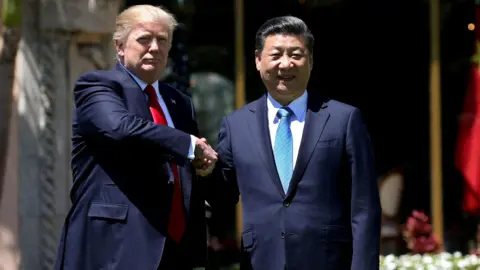US and China agree framework of trade deal ahead of Trump-Xi meeting

Michael RaceBusiness reporter
 Reuters
ReutersThe US and China have agreed the framework of a potential trade deal that will be discussed when their respective leaders meet later this week, the US treasury secretary has said.
Scott Bessent told the BBC’s US news partner CBS that this included a “final deal” on TikTok’s US operations and a deferral on China’s tightened rare earth minerals controls.
He also said he did not anticipate the 100% tariff on Chinese goods threatened by US President Donald Trump coming into force, while China will resume substantial soybean purchases from the US.
Both nations are seeking to avoid further escalation in a trade war between the world’s two largest economies.
Trump and Chinese President Xi Jinping are due to hold talks on Thursday in South Korea.
Bessent met senior Chinese trade officials on the sidelines of the Association of Southeast Asian Nations (Asean) summit in Malaysia, which Trump is also attending as part of a tour of Asia. Beijing said they had “constructive” discussions.
Bessent said the countries had “reached a substantial framework for the two leaders”, adding: “The tariffs will be averted.”
The Chinese government said in a statement that both negotiating teams “reached a basic consensus on arrangements to address their respective concerns”.
“Both sides agreed to further finalise specific details,” they added.
Trump’s tariff tactics
Since Trump re-entered the White House, he has imposed and threatened sweeping tariffs on imports from overseas on various countries, arguing that the policy would help boost US manufacturing and jobs. The introduction of tariffs has resulted in many countries, including the UK, agreeing new deals with the US.
But the steepest levies he has threatened have been levelled at China. Beijing has hit back with measures of its own, though the two agreed to hold off implementing the levies while pursuing a trade deal.
However, earlier this month Trump said he would impose an additional 100% tarriff on Chinese goods from November in response to China tightening restrictions on export of rare earths – materials essential to the production of many electronics. The US president accused Beijing of “becoming very hostile” and trying to hold the world “captive”.
China processes around 90% of the world’s rare earths, which go into everything from solar panels to smartphones, making supply of them to US manufacturers a key bargaining chip.
The last time Beijing tightened export controls – after Trump raised tariffs on Chinese goods early this year – there was an outcry from many US firms reliant on the materials.
China will “delay that for a year while they re-examine it”, Bessent told a different news show, This Week, on Sunday.
Another issue of contention is soybeans, of which China is the world’s biggest buyer. As the trade war began heating up, China halted all orders, hurting US farmers.
Bessent hinted the boycott may soon be over but refused to give details.
“I’m actually a soybean farmer, so I have felt this pain too… I think we have addressed the farmers’ concerns,” he said on This Week.
“I believe when the announcement of the deal with China is made public that our soybean farmers will feel really good about what’s going on for this season and the coming seasons for several years.”
TikTok deal done?
Bessent also said a deal had been agreed on video-sharing platform TikTok’s US arm, with Trump and Xi left to “consummate that transaction on Thursday”.
The US has sought to prise the app’s US operations away from Chinese parent company ByteDance over national security concerns.
TikTok was previously told it had to sell its US operations or risk being shut down, but Trump has delayed implementing the ban four times to facilitate negotiations, and has extended the deadline again to December.
The White House announced last month that US companies would control TikTok’s algorithm and Americans would hold six of seven board seats for the app’s US operations.
While Trump initially called for TikTok to be banned during his first term, he has since changed course. He turned to the hugely popular platform to boost his support among young Americans during his successful 2024 presidential campaign.
On Sunday, Washington also annouced that trade deals with Malaysia and Cambodia had been secured and framworks agreed with Thailand and Vietnam.



